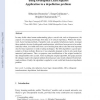Free Online Productivity Tools
i2Speak
i2Symbol
i2OCR
iTex2Img
iWeb2Print
iWeb2Shot
i2Type
iPdf2Split
iPdf2Merge
i2Bopomofo
i2Arabic
i2Style
i2Image
i2PDF
iLatex2Rtf
Sci2ools
CORR
2008
Springer
2008
Springer
Building an interpretable fuzzy rule base from data using Orthogonal Least Squares Application to a depollution problem
In many fields where human understanding plays a crucial role, such as bioprocesses, the capacity of extracting knowledge from data is of critical importance. Within this framework, fuzzy learning methods, if properly used, can greatly help human experts. Amongst these methods, the aim of orthogonal transformations, which have been proven to be mathematically robust, is to build rules from a set of training data and to select the most important ones by linear regression or rank revealing techniques. The OLS algorithm is a good representative of those methods. However, it was originally designed so that it only cared about numerical performance. Thus, we propose some modifications of the original method to take interpretability into account. After recalling the original algorithm, this paper presents the changes made to the original method, then discusses some results obtained from benchmark problems. Finally, the algorithm is applied to a real-world fault detection depollution problem...
| Added | 09 Dec 2010 |
| Updated | 09 Dec 2010 |
| Type | Journal |
| Year | 2008 |
| Where | CORR |
| Authors | Sébastien Destercke, Serge Guillaume, Brigitte Charnomordic |
Comments (0)

